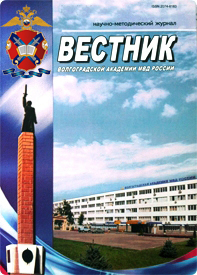The article presents the outcomes of research on problems arising during application of the rule provided for in article 256 of the Criminal Code of the Russian Federation. It’s necessary to analyze such problems due to the fact that the state of biological environment in our country is deteriorating from year to year if to consider the volume and condition of aquatic biological resources. It causes significant ecological and economic harm to the Russian Federation estimated at huge amounts of money. The use of many catch methods inevitably results in mass loss of fish, destruction of feed reserves and damage to the habitat of aquatic biological resources; the diversity of aquatic biological resources is dramatically decreasing; illegally extracted water resources are annually transported abroad. The author presents criminal-legal characteristics of the given crime, analyzes current law-enforcement practices, determines the most common mistakes and difficulties arising in qualification of the act provided for in article 256 of the Criminal Code of the Russian Federation. The recommendations for application of the given rule are suggested. The author reveals problems connected with application of evaluative features when qualifying illegal catch of aquatic biological resources. This process turns out to be intricate.
criminal legislation, principles of criminal law, evaluative features, illegal catch of aquatic biological resources
1. Ob utverzhdenii Strategii razvitiya rybohozyaystvennogo kompleksa Rossiyskoy Federacii na period do 2020 goda: prikaz Rosrybolovstva ot 30 marta 2009 g. № 246. Dostup iz sprav.-pravovoy sistemy «Konsul'tantPlyus».
2. Laptev I. P. Racional'noe ispol'zovanie, ohrana i vosproizvodstvo vodnyh zhivotnyh. Tomsk, 1988.
3. D'yakonova L. V. Nezakonnaya dobycha (vylov) vodnyh biologicheskih resursov // Zakonnost'. 2011. № 12. S. 36-37;
4. Sostoyanie prestupnosti za 1997-2016 gody. M.: GIAC MVD Rossii, 2017.
5. Zabavko R. A., Radchenko O. V., Kupchinskiy A. B., Dzyuba E. V. Problemy kvalifikacii i rassledovaniya nezakonnoy dobychi (vylova) vodnyh biologicheskih resursov: ucheb. posobie. Irkutsk: FGKOU VPO VSI MVD Rossii, 2014.
6. Lopashenko N. A. Vvedenie v ugolovnoe pravo. M., 2009.
7. Kobzeva E. V. Ocenochnye priznaki v ugolovnom zakone. Saratov, 2004.
8. Kanubrikov V. A. Ocenochnye priznaki: problemy primeneniya i sootvetstvie principam rossiyskogo ugolovnogo zakonodatel'stva // Yuridicheskaya nauka i pravoohranitel'naya praktika. 2015. № 2. S. 39-44.
9. O nekotoryh voprosah primeneniya sudami zakonodatel'stva ob ugolovnoy otvetstvennosti v sfere rybolovstva i sohraneniya vodnyh biologicheskih resursov (ch. 2 st. 253, st. 256, 258.1 UK RF): postanovlenie Plenuma Verhovnogo Suda Rossiyskoy Federacii ot 23 noyabrya 2010 № 26 (red. ot 26.05.2015). Dostup iz sprav.-pravovy sistemy «Konsul'tant Plyus».
10. Prigovor suda Pavlovskogo rayona Nizhegorodskoy oblasti. Delo № 1-7/2017. URL: https://rospravosudie.com (data obrascheniya 21.02.2017)
11. Prigovor suda rayona «Nanayskiy rayon Habarovskogo kraya». Delo 1-27/2017. URL: https://rospravosudie.com (data obrascheniya 21.02.2017). 12.









